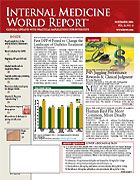Publication
Article
New Biologic Extends Life in Advanced Colon Cancer
Author(s):
WASHINGTON, DC—A new option may soon be available that will extend survival in patients with metastatic colorectal cancer who have not responded to standard chemotherapy.
Results from the long-awaited, pivotal phase 3 study of the investigational biologic panitumumab (Amgen) show that it significantly improves progression-free survival, researchers announced at the annual meeting of the American Association for Cancer Research. “Panitumumab, given every 2 weeks, reduced the rate of disease progression by approximately half compared with best supportive care alone in these heavily pretreated patients,” said lead investigator Marc Peeters, MD, PhD, coordinator of the Digestive Oncology Unit, University Hospital, Ghent, Belgium.
IMWR
Panitumumab is the first fully human monoclonal antibody that targets the epidermal growth factor receptor (EGFr), a naturally occurring protein that plays a crucial role in cancer-cell signaling. “That’s why, unlike cetuximab, [Erbitux] panitumumab does not need premedication with steroids or antihistamines to manage infusion reactions,” he told .
In the multinational, open-label study comparing an EGFr-inhibitor arm and a best-supportive-care arm, 463 patients with metastatic colorectal cancer refractory to standard chemotherapy were randomized to receive 6 mg/kg panitumumab plus best supportive care every 2 weeks or supportive care alone.
The group treated with the study drug showed a 46% decrease in tumor progression rate compared with supportive care alone. At week 24, nearly 4 times as many panitumumab patients were progression-free, and at week 32, twice as many were progression-free compared with the supportive care group.
Approximately 75% of the supportive care patients then entered a crossover arm and received panitumumab if their disease recurred. “We saw one complete response, a 9% partial response, and 32% stable disease,” said Dr Peeters.
The most common side effect was reversible skin rash, followed by fatigue, nausea, and diarrhea. “We saw no human-antihuman antibody or antipanitumumab antibody formation,” he said.
The FDA assigned a fast-track review status to panitumumab in 2005.






